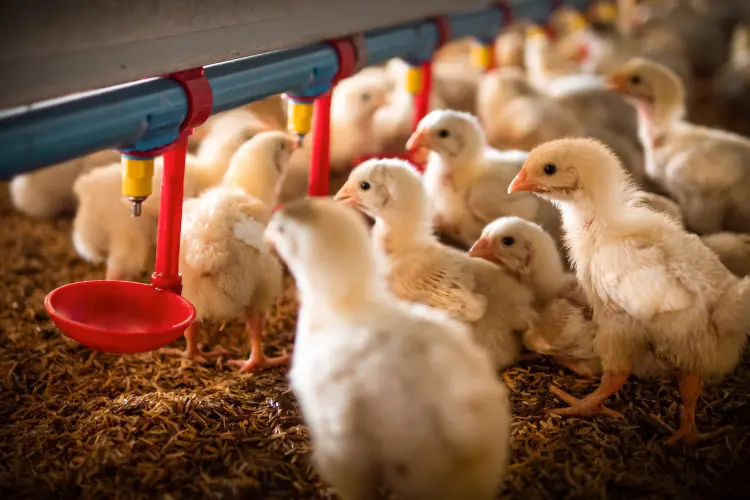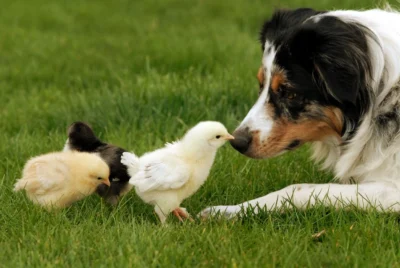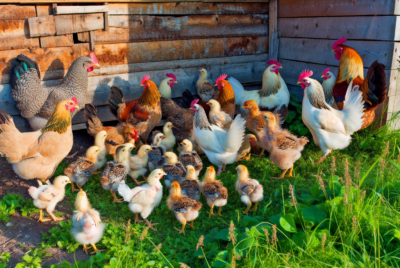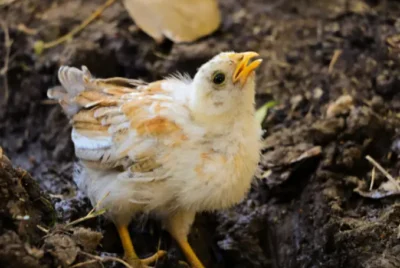Best Chicken Water Cups 2023: Ultimate Buyer’s Guide
Are you tired of dealing with messy and unreliable water dispensers for your chickens? Many poultry keepers struggle with inefficient watering systems that lead to wet bedding, wasted water, and frustrated birds. If you’re still using outdated methods to provide water to your chickens, you’re likely facing these problems.
So, I tested and reviewed different best chicken water cups available in the market to show you why these water cups are a must-have for any chicken owner, making your life easier and your chickens happier. Don’t let your feathered friends suffer from subpar water solutions – read on to learn more.
Reviews of the Best Chicken Water Cups
1. Automatic Chicken Water Cup Waterer Kit for Poultry

I recently incorporated RentACoop’s Automatic Chicken Water Cup Waterer Kit for Poultry into my poultry setup, and I’m genuinely thrilled with the results. These cups can provide a consistent and clean water source for my flock.
One of the standout features is the automatic water flow – no tabs to push or float valves to worry about. The cups are always half full, ensuring that my chickens, ducks, and even geese have constant access to water, making it perfect for those scorching 80-degree days.
I also appreciate the versatility of these cups, whether you have a gravity-fed system attached to a bucket or a setup with a float valve or pressure regulator, these cups work seamlessly.
Installing them was a breeze with a 3/8″ drill bit, and I placed them 1″ above the bucket’s base. But what truly sets RentACoop apart is their exceptional customer service; they’re always ready to answer any questions.
Pros
- Effective in maintaining water cleanliness
- They provide an automatic water flow feature
- Installation of these drinking cups is straightforward
- Manufactured in the United States
Cons
- Cleaning them can prove to be a challenging task
2. RentACoop Anti-Dirt Cover Auto-Refill Watering Cups

I tested the RentACoop Anti-Dirt Cover Auto-Refill Watering Cups, and they’ve been a game-changer for my poultry care routine. These cups effectively prevent my chickens from perching on or bumping into them, keeping the water clean and reducing dirt and debris.
Plus, they shield the water from unpredictable weather conditions. The package includes 2 Patent Pending Anti-Dirt Covers, straightforward installation instructions, and top-notch customer service for any queries. Setting up these cups was a breeze, and they have significantly reduced my poultry water-related headaches.
Pros
- Suitable not only for chickens but also for ducks, geese, turkeys, and other poultry.
- Made from high-quality materials.
- Large cup size.
- Setting up these watering cups is straightforward.
- Reduces water contamination
Cons
- These cups need to be installed in containers with specific hole sizes.
3. Lil Clucker Large Automatic Chicken Waterer Cups

Lil Clucker Large Automatic Chicken Waterer Cups are a game-changer for anyone tending to a flock. They ensure a constant supply of clean drinking water for your chickens, ducks, geese, turkeys, quails, or rabbits, making them a versatile addition to any coop. With an almost 3″ diameter, these cups allow chickens to comfortably dip their wattles and ducks to sip easily.
What truly sets these automatic water cups apart is their user-friendly design. Use a 3/8″ drill bit to create holes in your container or opt for the 5/16ID+7/16OD tube method. Whether you have a low-pressure setup with a bucket, a pressure regulator, or a float valve, these cups are a perfect fit, with a maximum working pressure of 3 PSI.
What I love most about these Lil Clucker waterer cups is their superior design to traditional nipple waterers. The large bowl size ensures that your birds have easy access to water, and the cups automatically refill, ensuring a constant water supply.
Pros
- Their ample size also facilitates straightforward cleaning
- Each purchase includes a complimentary drill bit
- They feature oversized cups, accommodating various poultry types
- These cups exhibit exceptional durability and craftsmanship
Cons
- Each pack contains only five cups
- They are slightly pricier compared to alternative cup options
4. RentACoop Chick2Chicken 10lb BPA-Free 4-Port Feeder

What sets RentACoop Chick2Chicken 10lb BPA-Free 4-Port Feeder apart is its versatility – it’s not just a feeder; it’s a lifetime feeder that accommodates chicks as young as 3 days old to full-grown adult chickens, making it perfect for various bird species, including Quail, Pigeons, Doves, and more.
With a 10lb storage capacity, it means fewer refills and easy maintenance. Whether you’re feeding pellets, crumbles, or scratch grains, this feeder covers you with its four feeding ports.
It also has an innovative design that keeps dirt and debris out while ensuring that feed and water stay in. With four medium ports, this feeder can easily accommodate larger flocks, making it suitable for up to 20 chicks or 12 adult chickens.
This feeder is weatherproof, so it can be placed anywhere in your coop and is suitable for all seasons. Plus, in the box, you’ll find all the hardware you need to get started: the 10lb feeder, four easy-to-install ports with slider port covers, the Anti-Roost Cone, and a lid for easy access and maintenance.
Pros
- It is suitable for chicks as young as 3 days old up to adult chickens,
- Large capacity
- It reduces wasted feed on the ground.
- The four medium ports can accommodate up to 20 chicks or 12 older chickens
- It is weatherproof and suitable for all seasons
- Easy setup
Cons
- Due to its 10lb capacity, the feeder can become quite heavy when fully loaded
- Given its size and capacity, this feeder may require more space in your coop or run
Factors to Keep in Mind When Purchasing a Chicken Water Cup
Size of Your Flock
When it comes to choosing the best chicken water cup, the number of birds you have plays a pivotal role in determining the appropriate size and number of units you’ll need. A general guideline is to provide a minimum of three chicken water cups for every 6-10 chickens, ensuring that each chicken gets adequate access to clean water without crowding or waiting.
Simplicity of Use and Maintenance
Both you and your chickens will benefit from a water cup that is simple to use. For the keeper, an easy-to-fill and clean water cup saves time and minimizes hassle. For chickens, especially younger ones, a straightforward and accessible design ensures they can hydrate themselves easily. Especially for chickens that find it difficult with peck-style cups.
Consider a design with detachable parts for thorough cleaning and minimizes spillage to keep the coop dry and clean.
Longevity and Material Quality
Materials matter. Opt for chicken water cups made from robust, non-toxic, and weather-resistant materials such as high-quality plastic or stainless steel. These materials should withstand daily use, resist wear and tear, and be impervious to environmental factors to ensure a long lifespan and safe drinking water for your chickens.
Water Contamination Prevention
The best chicken water cup design should minimize the risk of contamination from debris, feed, and droppings. Opt for cups with a design that prevents chickens from perching atop them and ensures that the water source is shielded from potential contaminants.
Additionally, the water system should prevent the backflow of water into the supply line, ensuring that clean water is always available to your flock.
Climate Conditions
Depending on your geographical location, your water system may need to accommodate various weather conditions. In colder climes, an insulated or heated water cup may be necessary to prevent freezing, whereas, in hotter areas or exposed to direct sunlight, a shaded or cool location may be required to keep the water at a pleasant temperature and prevent algae growth.
If you’re in need of the best heated chicken waterers to combat the chill, make sure to check out our comprehensive buyer’s guide for top recommendations and valuable insights.
Cost Range
While investing in good quality is vital, working within your budget is equally crucial. Explore options that provide durable quality without breaking the bank and consider the long-term viability of the water cup. Sometimes, investing more upfront can save on replacement costs and minimize issues down the line, providing better value over time.
Pros of Chicken Water Cups
Ease of Use for Poultry
Chicken water cups are lauded for their straightforward functionality which does not necessitate training for the poultry. Chickens naturally peck at things and will intuitively peck at the water cup triggering the mechanism to release water.
Preservation of Clean Water
In traditional open watering systems, the water is exposed to potential contaminants including dirt, feed, and fecal matter. In contrast, chicken water cups are closed systems, preventing direct contamination and thereby typically offering a cleaner water source and conserve water.
Economical and Resourceful
The economical aspect of chicken water cups encompasses both water conservation and financial affordability. They utilize an automatic refilling mechanism, which tends to minimize water wastage.
Installation Simplicity
Installation and setup of chicken water cups are often straightforward, making them a viable option for poultry keepers with varying levels of expertise. With basic tools and following manufacturer guidelines or online tutorials, you can install these systems with ease.
Cons of Chicken Water Cups
Quality of Stagnant Water
Although the water within the cups is sealed from external contaminants, stagnation can be a concern. Water that sits idle in the lines or cups can promote algae growth or harbor unpleasant odors, particularly in warmer climates.
Risk of Mechanical Failure
As with any mechanism, chicken or poultry drinking cups are not immune to wear and tear. Particularly in systems that utilize more intricate mechanisms to control water flow, there is a potential risk of malfunction over time.
How To Install Chicken Water Cups
Installing a chicken water cup typically involves detailed instructions, yet the basic steps are straightforward. Begin by selecting a suitable container for holding the water; this might be a bucket, a trash can, PVC pipe or another sizable vessel, ideally with a capacity of more than five gallons.
Typically, holes for the water cups should be drilled around the chest to the eye level of your chickens to facilitate easy access, but always refer to the specific guidelines on the packaging for precision.
Once you’ve filled your chosen container with water and securely placed the water cup in the drilled hole, you must thoroughly check for any potential issues such as cracks, leaks, or stuck valves. Ensuring a leak-free installation before you step away will safeguard against unnecessary water waste and ensure continuous access to clean water for your flock.
Always keep a vigilant eye initially to confirm your chickens are utilizing the new system effectively and troubleshoot any issues that might arise.
Where To Put Chicken Water Cups?
Ensure they’re located away from high-traffic areas to safeguard against accidental damage through bumps or kicks. Also, establishing a sensible distance between water and feeding zones prevents potential contamination from feed spillage or chicken activity.
My Best Pick For The Best Chicken Water Cups
After thorough research and hands-on experience, I’m confident in declaring my best pick for the best chicken water cups is the Automatic Chicken Water Cup Waterer Kit for Poultry. These cups have proven reliable, efficient, and user-friendly, addressing common poultry water-related challenges easily.
The long-term benefits in terms of water quality and convenience make them a worthwhile addition to any poultry setup. This is a top choice for anyone seeking reliable and effective chicken water cups.








